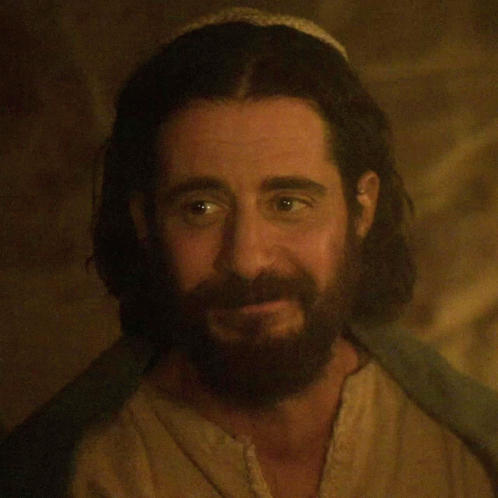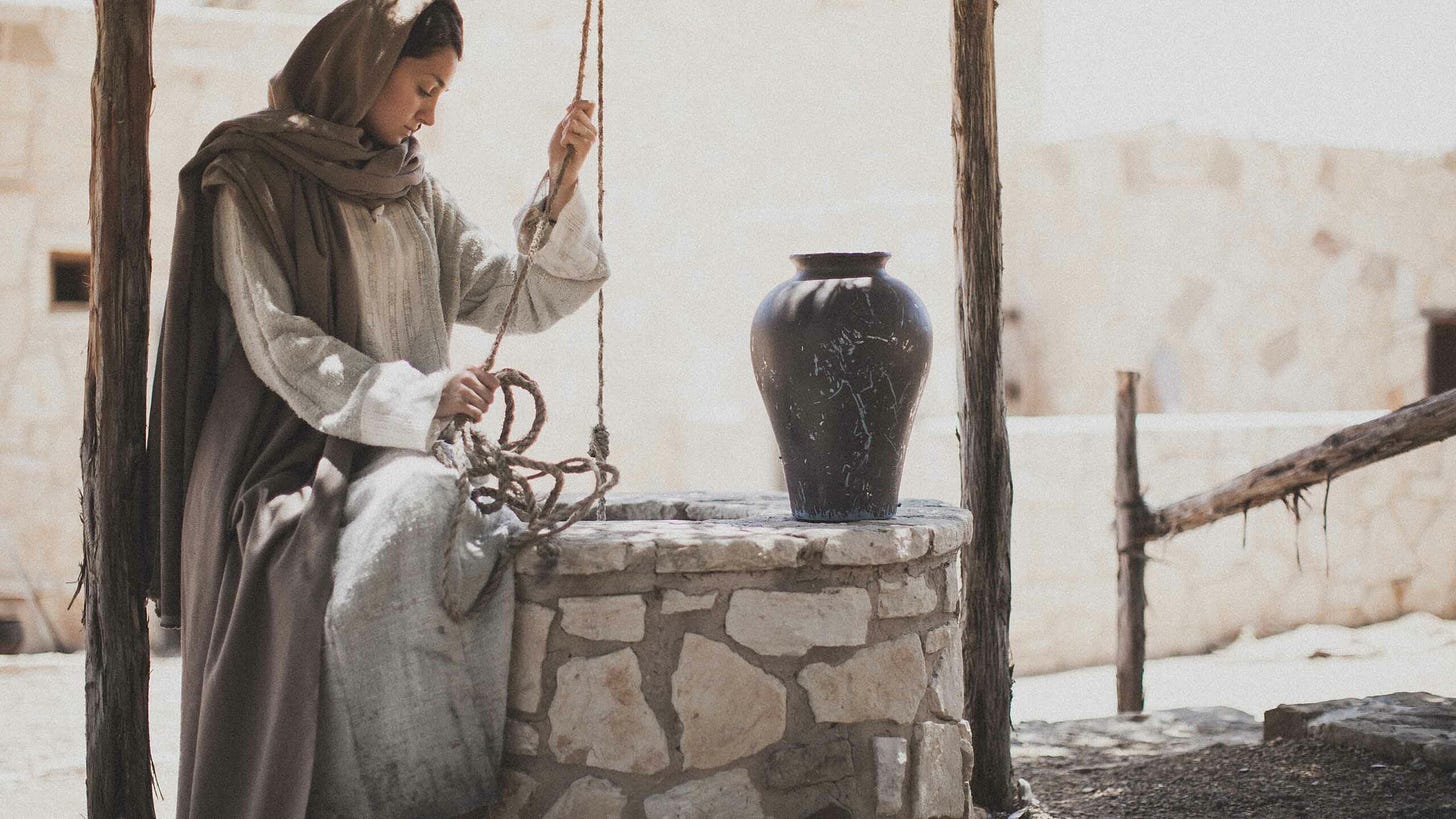Was that really you Lord, or just my imagination?
Imagination is how we all access what is most real to us, and Ignatian imaginative prayer reveals how what happens in our prayers can be the most real thing of all.
A few years ago, in a time of prayer, in my mind's eye, I saw Jesus. He stood before me with his head jauntily cocked to one side. Winking at me, he asked a rhetorical question, his voice full of mirth, knowing my answer before I gave it.
'Follow me?'
My answer was a silent yes; no words were required; he already knew my answer.
Last year the Lord reminded me of that moment. He asked me again, 'Follow me?' My answer again was a silent yes. Moving towards him this time meant I sold my house, left the church I had planted, and moved away from friends and family - all because I had imagined Jesus speaking to me and asking me to follow him.
Since making that move, there are times when I have questioned if what I had imagined was real in the face of loss and challenges. I know I am not alone in asking, 'Was that really you, Lord or my imagination?'
Imagination is how we enter all of life
We think imagining something means it is not real. Imagining something can certainly be to conjure something that is not real or true but is the product of fear, anxiety, narcism and overinflated egos.
But the most real things in life are all imagined. We anticipate the future by imagining what might happen. We extrapolate stuff from the past to project what might come next. We invest, hoard, give away and pour out the raw materials of life - time, energy, and money - for things we imagine might be better for us and what we love.
The most real things in my life have been imagined before they happened. Leaving school, home, getting married, having kids, and flying on holiday.
And we re-enter the best and worst of life with our imagination. Chronic abuse and abandonment from my childhood primed me to imagine the worst about my present. Unless I cared enough for the people I loved, they would leave me, like my Dad did.
We are all running internal stories about what life is, what is real, what we fear, hope for and long for and measuring who we are and what we do against them.
More than a story
In some senses, when we read bible stories and enter into them, explore them and let them become our story. Do so so is as real as the other ways we imagine our ways through life. Stories about Jesus two thousand years ago can become real ways to imagine living now. Examples, templates and measures.
For example, when someone wrongs me, I can imagine their comeuppance. Or I can recall Jesus in Luke 6:37 "Do not judge, and you will not be judged. Do not condemn, and you will not be condemned. Forgive, and you will be forgiven." And I might then step into a different future for my abuser and their future. How to forgive the person who wronged me and what their life and mine might be if that imagination came to pass.
But we misunderstand if we think we are just invited to go back two thousand years, or even further into the old testament, and take scenes from the past, with people long dead and gone, so their stories and truths might be applied to the present by my imagination. Something much more profound takes place and is the real invitation from God to us with our meditation and contemplations.
We are invited to sit before God with his word and, through our mind's eye, enter into 'salvific experiences of the risen Jesus, personally present right now in the Spirit to you and to us all.' 1
In other words, time with God with his word is more than concepts and truths to deploy today and more than things God brings to life in the present. He wants to bring me into those moments where the past is present to me now. When I meditate on the gospels and enter them with my senses, it is as if by the Spirit, I am there taking part in what happened.
This is partly why Christ said in John 16:
I tell you the truth: it is to your advantage that I go away, for if I do not go away, the Helper will not come to you… But if I go, I will send him to you. In a little while, you will see me no more, and then after a little while, you will see me.
When I pray and consider Jesus walking on water, I learn principles to apply to the storms of life now. Also, the Holy Spirit wants to bring realities that others encountered in the boat two thousand years ago to me now. But most of all, the Spirit seeks to open space and time, take me to the boat, have that past be my present, and encounter the Lord alongside the disciples.
Ignatius knew this from his experiences and leading others in the Spiritual Exercises. He knew that having people use their imaginations to consider standing before the cross resulted in people having experiences as if they were there. And how when we practice talking to God (what Ignatius called colloquy), God speaks to us. What we think might be just our imagination is a portal to bring the past to the present and open up God's work in our future.
One of the most powerful imagined things in my life
During the 19th annotation, a ten-month journey through the Ignatian Spiritual Exercises, I had an imagined experience of Jesus. In the 19th annotation, you read the bible every morning and prayer, sit with the Lord and talk to him, journal your experiences and process them with a spiritual director meeting once a week. You use ways of praying from Ignatius, with your imagination, to enter the stories you are reading.
I was reading the story of the woman at the well. As I imagined being with Jesus at the well, it became one of my most real encounters with Christ. As real as the strongest things my imagination has either feared or longed for. An experience that transformed me, haunts me, and sustains me.
I apprehensively copy and paste from my journal about that experience. Not because there is anything about my experience that makes me an exemplar, but because I don't want to share this idea of how the Lord wants to be present to us without sharing a story of having experienced that.
John 4:1-14. What thirst do I need Jesus to fill with the overflowing living water of His love?
18th May 2021
So much in this passage that I have explored recently. That Jesus, in the face of fake news, 'had to go through Samaria'. His had to was the direction of the Father; this was not the route Jews would take. I notice he was weary, sending the disciples away so he might be on his own to discover why the Father had sent him there - so I suspect.
Then as he gets to Jacob's Well needing a drink, this woman appears, and Jesus moves into the revelation and interaction the Father had sent him there for. In their exchange, Jesus does not get his drink, and the woman forgets her own need for water. Such is the difference in Christ as he interacts with the woman that when the disciples return, they wonder if he has eaten already. Like the deepest loves of life, with our partners, and children, we can forget our physical needs as deeper needs are met. Then life takes its shape around that love. The woman is now free to get her water at cooler and better times of the day; the water of life has transformed her external reality too.
This much I already knew.
But the Lord invited me into this story with him. I sat and watched as it unfolded. Then the woman left, leaving her jar behind in v28. The spirit had my attention on that. Jesus asked me to consider the jar and what leaving it meant. Then he asked me why my jar was so large.
I was puzzled and looked down, and I saw my jar. It was huge to carry my water and the water of others.
Jesus: Why do you carry water for others that they need to collect themselves?
Me: I must take it to them because they won't come to get the waters of life.
Jesus: But if you keep taking it to them, will they ever come to me for water?
Will I put down my jar, I wonder?
As I look at it, I resent it, the work to carry it, and the people I judge when I take it back to them. The Lord never asked me to make this jar or carry it. He wants me free from it, to break it. Then there is no choice but to drink the water he has for me and for others to collect their own, should they wish to.
In my mind's eye, I set down this huge jar. Even breaking it would take effort I do not have. It is like Jesus reads my mind.
Jesus: We are both weary from the journey, and it would be an effort to break it, yes? Instead better to fill it with soil and living water. To have life in it, that others can come to see by this well.
I set this giant jar down, struggling to place it. Jesus passes his hand over it, and suddenly it is filled with soil and beautiful flowers. It will be here every time I return to this place—a reminder to let it go and the call to take up my own jar.
Jesus: Will you take up your jar, the one meant for you from our heavenly Father?
I feel it in my soul, the longing that had me carry the giant jar, exhausted and wanting this jar, the one made for me. I look down, and there is a small jar in my hands—sturdy, cool to the touch, not too heavy or light. It is the right size for me.
The Lord reaches over and lays his hand on it, which is now full of water. 'Yes!" says the Lord, raising a jar in his hands to mine in a toast.
We drink deeply of the Father's love for us both. My cup overfloweth. My jar is meant to be full of his life for me, not his life for others. I am meant to sit with others who have let Jesus fill their jars and taste together how good the Lord is.
In my life, I need to come to Jesus for his water for me. I need to leave the jars of others and instead invite them to come to meet Jesus for him to be their living water. Notice those moments of resentment at the load I carry, the burden from my anxiety and control. And put down that jar. Sit with Jesus and breath in and out through my heart this experience, over the anxiety of burdens I was never meant to carry and let them go. Learn to refuse to pick the jars of others.
Displaced into the Eschaton
Did this really happen? No, and yes. I remained in my study, and anyone looking at me would have seen me sitting silently, breathy slowly and sometimes weeping.
In the story of the woman at the well, I was taken by the Spirit to help me understand a different way to live in the present. The Father, by the Spirit, made the past present and alive to me. But I believe something else happened. Space and time opened over me, and I was displaced into the eschaton. The past was present to me, and I was present to the past as if I was really there.
And somehow, some malware installed in me in my childhood that had been running in the background, against the best interest of my relationship with God, was quarantined.
And last year, when I imagined Jesus calling me to follow him, the risen Jesus, Lord of creation, space and time, appeared to me.
This experience and understanding of prayer have transformed my prayer life. Some mornings are like others before this experience—pedestrian and mundane. But I can rise in the morning not just thinking about what I might read and who I might pray for but excited to consider how the Lord wants to open heaven over me and gather me into his reality.
I do not need to go anywhere special. I have been translated into the eschaton in my study, a hotel lobby, a plane, a church service, a retreat, a work meeting, and a walk. And all without payment and price.
Isaiah 55
1 "Come, all you who are thirsty,
come to the waters;
and you who have no money,
come, buy and eat!
Come, buy wine and milk
without money and without cost.
John 7
37 On the last day of the feast, the great day, Jesus stood up and cried out, "If anyone thirsts, let him come to me and drink.
Using your imagination in prayer
You might want to know more theologically how it can be true that the past is made present to us by the Spirit. I'll be writing more on that and pointing to the amazing resources that help us understand how this is so.
But meanwhile, you might want to know how your prayer life might expand into experiences of the Lord with your imagination. Of course, undertaking Spiritual Exercises is something the Lord might be inviting you into.
But for something simpler and more immediate based on the Ignatian prayer practices, you might want to try this prayer guide to reading the bible:
In Imagine You Walked with Jesus, you'll be introduced to contemplative prayer through forty episodes from the Gospels. Spend 40 days in the gospels with Ignatian contemplative prayer and see what the Spirit does with you through your imagination.
And one of my favourite ways to use my imagination with the gospels is The Chosen. If the Spiritual Exercises had a TV series created from Ignatian imaginative prayer, this would be it. Binge on this free TV series, open up your bible, read the gospels in prayer, and see what happens.
What have you imagined?
When have you heard the Lord and wondered if it was just your imagination? What have you imagined that was more real than real? How has the Lord displaced you into the eschaton to encounter him?









![Imagine You Walked with Jesus: A Guide to Ignatian Contemplative Prayer by [Jerry Windley-Daoust] Imagine You Walked with Jesus: A Guide to Ignatian Contemplative Prayer by [Jerry Windley-Daoust]](https://substackcdn.com/image/fetch/$s_!mI7r!,w_1456,c_limit,f_auto,q_auto:good,fl_progressive:steep/https%3A%2F%2Fsubstack-post-media.s3.amazonaws.com%2Fpublic%2Fimages%2Fd30db4e3-dc19-4253-b743-8a96ff666bc8_327x500.jpeg)


I love this. Feel inspired to go imagine…
This was gold. Thank you Jase for putting it out there.
It made me consider something I’ve heard about the Catholic imagination. I think this is accurate: that every mass is living out both the Last Supper and the Wedding Banquet. The priest is Jesus. All is condensed into one divine meal together- all peoples, all histories, one meal.